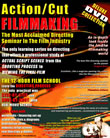|
|
FEATURES
- Writing a Great Screenplay
Page 3
|
 |
|
|
|
|
|
|
|
|
| Sponsors |

|
|
|
 |
|
 |

|
|
Writing a Great Screenplay
|

|
|
Finally he would work the script through his mind, making a final card for different scenes or sequences throughout his newly formed movie screenplay. Another writer, John Singleton, utilizes a journal to write down everything that is going on around him and how it would pertain to a film. He takes these thoughts and transfers them to 3 by 5 cards, each scene having its own card, eventually plotting out an entire script.
|
|

|
|
|
Being Creative
|
 
|
|
Discovering the source of stories you are best qualified to tell often comes down to finding new connections between causes and effects in your own life. It means identifying what distinguishes your life from others. Where, after all, does the belief and drive to create something like a story come from?
It exists because you carry markings from emotional experience. You feel the impact of particular personalities and situations during your development. For a work to be meaningful to others, it has to go further than merely reflecting actuality. It has to imply ideas about those people and phenomena.
Usually an idea starts out with a simple sentence. For example, someone may say "What if a guy falls in love with a mermaid?" This was Brian Grazer's idea and became the 1980's comedy Splash. Another example could be a movie about creatures going to battle in outer space, in which you come up with films such as Starwars.
In any case, the writing process usually requires extensive research. Much of the time, the story is set in a world unfamiliar to the writer which presents many challenges. This may consist of geographical challenges, such as a writer whom lives in the United States writing about life in a third world country.
Geologic or historical challenges may occur when a writer decides to write a screenplay on something that occurred in the past. Mental and or physical challenges may take place when someone decides to write about being handicapped in some way such as being deaf or being a paraplegic. Every project presents its own set of unique research obstacles.
|

|
|
|
|
|
In filmmaking, as in theater or journalism, one must strongly define one's own point of view, or see one's prerogatives plucked away by stronger-willed colleagues, actors, or crewmembers
|
|

|
|
|
Once the concept is clear and the research under way most writers turn their attention to structuring the story, seeking out a natural beginning, middle, and end. Most use a three-act structure as their basic building block, though strategies vary from writer to writer. "Story is structure" is one of screenwriting's most enduring clichés, and not without reason.
Many of the most successful writers say that story structure is the single most important function of the writing process, one that will ultimately determine the success or failure of the script and of the film itself. Comedy can present special structural problems. When writing comedy, Ganz and Mandel (City Slickers, Parenthood) also tend to start with the needs of the characters and the actors who play them.
"If your interest is situation comedy, begin to analyze every comedy on television," suggests K Callan in her book The Script is Finished. "Watch the good and the bad. Tape them and watch them over and over. Why is Seinfeld appealing? Does it have more jokes? More interesting characters? Does the story unfold more quickly than on a show you don't like as well? Or does that even matter?" Those who create successful stories always seem aware of their themes.
Recalling the raw material of one's life and engaging with it anew can be uncomfortable or even frightening. But inner conflict and unhappiness are normal and necessary parts of the human experience, and they denote the very dissatisfaction that turns a human life into a productive quest.
In filmmaking, as in theater or journalism, one must strongly define one's own point of view, or see one's prerogatives plucked away by stronger-willed colleagues, actors, or crewmembers. A writer or director must work to find a clear sense of direction. Whether comedy or drama, the primary task of the screenwriter tends to be the structuring of the story. Once the structure or "spine" of the story emerges, it's time to focus on the characters that will inhabit that story and what they will learn along the way.
|
|

|
|
|
Writing Character's VS Writing Stories
|
 
|
|
A script is said to be story driven if it relies primarily on a high-concept plot, one that implies action and conflict and can be readily gleaned from a brief synopsis, such as: "A kid is inadvertently left home while his parents go on vacation."
On the other hand, a script is said to be character driven if its appeal relies primarily on the development of the characters and the changes that their personalities undergo during the film. Character-driven stories are generally perceived to be "softer" and less marketable than more action-oriented story-driven projects.
Examples of story-driven films are those such as Home Alone or Robin Hood, where character-driven films include Thelma and Louise and American Beauty. Bill Kelley feels that character and story elements work together and offers his own method for getting in touch with one's fictional progeny. "Every scene must reveal character and push the story forward."
|
|
|
|
|
|
|
|

|
|
|

|

|
|
top of page
|
Home
Page |
Contests
| Indies
| Features
| News
| Resource
Links
| Advertise
With Us |
Important
disclaimer
Copyright ©
1999-2011 by FilmMakers.com. All rights reserved.
FilmMakers.com
is a division of Media Pro Tech Inc.
|

|
|
|